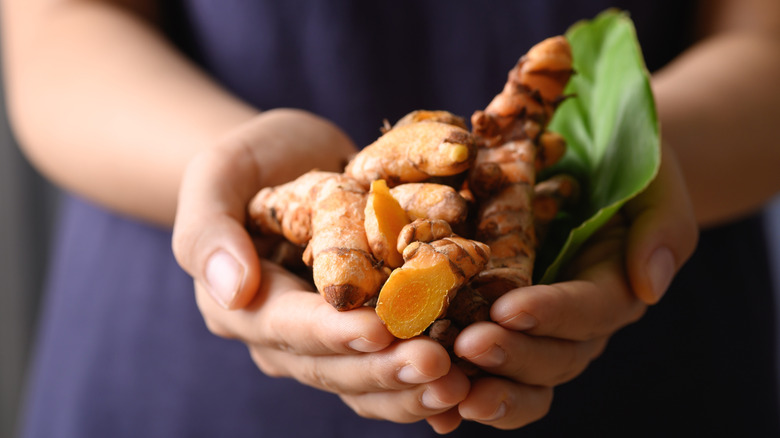Turmeric is one of those underrated spices that deserves more attention. Without its earthy taste and vibrant yellow hue, many curries, cheeses, butters, and mustards would fall flat of their potential. Yet turmeric’s value isn’t limited to what it brings to recipes. Turmeric has both documented and anecdotal evidence as a medicinal agent that, among other benefits, may promote mental well-being.
The secret behind turmeric’s mood-boosting potential comes from an active compound, curcumin. For years, curcumin has been heralded for its effects as an anti-inflammatory agent. But is it time to add “antidepressant” to the list of curcumin advantages? To find out, Health Digest sought the advice of Courtney Pelitera, a registered dietitian who specializes in sports nutrition and wellness nutrition at Top Nutrition Coaching.
Pelitera is familiar with curcumin’s reputation as being potentially helpful for treating depression. She explains, “It is thought that curcumin supplementation can help increase brain-derived neurotrophic factor (BDNF). Low levels of BDNF are associated with depression, bipolar disorder, and anxiety-related disorders.” She adds that promising research shows that increasing BDNF may reduce anxiety-related disorder symptoms.
Alleviating depression through nutrition
A 2023 study from Pharmaceutics acknowledges the possibility of interconnectivity between heightened BDNF performance and mood disorder improvement. Meanwhile, in a 2020 article in Frontiers in Cellular Neuroscience, researchers determined that enhancing the signaling capabilities of BDNF could lower depressive responses.
This only proves that BDNF levels may have a symbiotic relationship with depression; it doesn’t prove that curcumin can stimulate BDNF. With that said, a 2019 review in Nutrition Research analyzed studies which found elevated levels of BDNF among adult participants who ingested controlled doses of curcumin for either eight or 12 weeks.
Whether or not curcumin boosts BDNF, the compound has shown promise in other studies as a depression treatment. Case in point: Authors of a 2020 review in Frontiers in Psychiatry examined evidence supporting the use of curcumin to treat major depressive disorder (MDD). They determined that curcumin could be a promising alternative to other types of MDD treatments, although more research was recommended. And findings from a 2022 review in CNS Drugs echoed the same results on curcumin, noting that its clinically demonstrated positive short-term efficacy in both human and animal subjects with MDD made it worth researching for longer periods to explore and identify safe dosing levels.
Improving mood with food
These outcomes indicate curcumin’s potential, but the compound has a drawback: Its bioavailability is limited because it’s metabolized rapidly. Consequently, researchers have recommended pairing ingredients with curcumin-rich foods (like turmeric) to improve absorption. One winning combination appears to be turmeric and black pepper. Notably, a 2014 study in Cancer Research and Treatment found that piperine (from black pepper) increased the bioavailability of curcumin in humans by 2000% in less than an hour after consumption of both ingredients.
If you’re interested in experimenting with turmeric for your mental health, you can always try some of Pelitera’s favorite recipes. For instance, she suggests drinking store-bought or homemade turmeric tea, or enjoying a golden milk latte made with warm milk, honey, and dried turmeric. She also encourages pairing turmeric with chicken and lamb dishes, adding it to spice rubs, and sprinkling it with olive oil, salt, and black pepper over roasted vegetables. And she’s always a proponent of using it in a homemade curry sauce.
Regardless of how you bring turmeric into your kitchen, remember that it isn’t just a mood enhancer. Beyond its anti-inflammatory and antidepressant properties, turmeric may have antimicrobial and cold-fighting abilities, too, as Pelitera explains. “Turmeric has been used for centuries for its antimicrobial effects in skin wounds, eye infections, and digestive issues,” she says. “Due to increase in blood flow, particularly through the lymphatic system, turmeric is a great way to give your immune system a little boost as well.”


